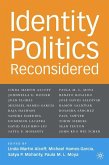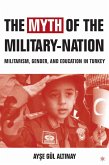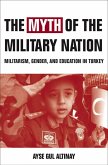At the intersection of the warmth of hearth and home and the dangers of the street lies the tenuous position of women engaged in reproductive labour, those involved in the sex trade and those in domestic positions. These are women who are vulnerable, exploited, and whose dirty work allows for the reproduction of traditional social mores and roles. Yet while they are used to sustain tradition, dialectically they reflect the hyperconnections of globalization through the migration of women, the development of placement 'agencies' that often are little but fronts for transnational crime; and the transfer of money from the developed countries to the oppressed world. This book focuses on the interaction of the global and the local through a close investigation of the political economy of desire and reproduction in three states that blur the line between developed and developing: Greece; Turkey; and Cyprus. These are countries at the crossroads, in flux, whose peripheral siting at the centre of global capitalism provides unusual insight into the dark recesses of patriarchy, paternalism and exploitation.
This book shows us what feminist international political-economy looks like: a Ukrainian woman trying to cope with neo-liberal restructuring by risking migration to work in a Turkish cabaret; a Chechen male 'impressario' importing women into Cyprus to reap profits; a Greek professional woman calculating the pros and cons of hiring a Filipina or a Sri Lankan woman as her domestic worker ; government officials using women's cheapened labor to solve their states' problems. Anna Agathangelou reveals how these very specific relationships together comprise the new global system. This is an engaging, valuable book for us all. - Cynthia Enloe, author of Bananas, Beaches and Bases: Making Feminist Sense of International Politics
Reproductive labor has for too long been sidelined in debates and actions around globalization. This thought-provoking and politically engaged book demonstrates the complicity of the state in the exploitation of reproductive labor in the interests of global capitalism and the importance of learning from the lives of female migrant workers. Drawing on empirical material to theorize the racialized feminization of the 'desire industries' and to explore the possibilities for organizing and change, Anna Agathangelou succeeds in making theory accessible and relevant. - Bridget Anderson, Centre On Migration, Policy and Society (COMPAS)
Madam and maid, master and slave: these remain central to capitalism even though we imagine them to be replaced byprivate relations of contract and choice. Agathangelou makes us look at the violence that lies beneath how people of rich countries come to know themselves as a people who possess the freedom to consume people and things, and how peripheral states come to participate in these arrangements. An utterly compelling analysis of the international 'commodification of the intimacies' of sex and domestic work, and of the race, gender, and class hierarchies of the global economy. - Sherene H. Razack, Professor, University of Toronto, and author of Looking White People in the Eye: Gender, Race, and Culture in Courtrooms and Classrooms and Dark Threats and White Knights: The Somalia Affair, Peacekeeping, and the New Imperialism
This book shows us what feminist international political-economy looks like: a Ukrainian woman trying to cope with neo-liberal restructuring by risking migration to work in a Turkish cabaret; a Chechen male 'impressario' importing women into Cyprus to reap profits; a Greek professional woman calculating the pros and cons of hiring a Filipina or a Sri Lankan woman as her domestic worker ; government officials using women's cheapened labor to solve their states' problems. Anna Agathangelou reveals how these very specific relationships together comprise the new global system. This is an engaging, valuable book for us all. - Cynthia Enloe, author of Bananas, Beaches and Bases: Making Feminist Sense of International Politics
Reproductive labor has fortoo long been sidelined in debates and actions around globalization. This thought-provoking and politically engaged book demonstrates the complicity of the state in the exploitation of reproductive labor in the interests of global capitalism and the importance of learning from the lives of female migrant workers. Drawing on empirical material to theorize the racialized feminization of the 'desire industries' and to explore the possibilities for organizing and change, Anna Agathangelou succeeds in making theory accessible and relevant. - Bridget Anderson, Centre On Migration, Policy and Society (COMPAS)
Madam and maid, master and slave: these remain central to capitalism even though we imagine them to be replaced by private relations of contract and choice. Agathangelou makes us look at the violence that lies beneath how people of rich countries come to know themselves as a people who possess the freedom to consume people and things, and how peripheral states come to participate in these arrangements. An utterly compelling analysis of the international 'commodification of the intimacies' of sex and domestic work, and of the race, gender, and class hierarchies of the global economy. - Sherene H. Razack, Professor, University of Toronto, and author of Looking White People in the Eye: Gender, Race, and Culture in Courtrooms and Classrooms and Dark Threats and White Knights: The Somalia Affair, Peacekeeping, and the New Imperialism
Reproductive labor has for too long been sidelined in debates and actions around globalization. This thought-provoking and politically engaged book demonstrates the complicity of the state in the exploitation of reproductive labor in the interests of global capitalism and the importance of learning from the lives of female migrant workers. Drawing on empirical material to theorize the racialized feminization of the 'desire industries' and to explore the possibilities for organizing and change, Anna Agathangelou succeeds in making theory accessible and relevant. - Bridget Anderson, Centre On Migration, Policy and Society (COMPAS)
Madam and maid, master and slave: these remain central to capitalism even though we imagine them to be replaced byprivate relations of contract and choice. Agathangelou makes us look at the violence that lies beneath how people of rich countries come to know themselves as a people who possess the freedom to consume people and things, and how peripheral states come to participate in these arrangements. An utterly compelling analysis of the international 'commodification of the intimacies' of sex and domestic work, and of the race, gender, and class hierarchies of the global economy. - Sherene H. Razack, Professor, University of Toronto, and author of Looking White People in the Eye: Gender, Race, and Culture in Courtrooms and Classrooms and Dark Threats and White Knights: The Somalia Affair, Peacekeeping, and the New Imperialism
This book shows us what feminist international political-economy looks like: a Ukrainian woman trying to cope with neo-liberal restructuring by risking migration to work in a Turkish cabaret; a Chechen male 'impressario' importing women into Cyprus to reap profits; a Greek professional woman calculating the pros and cons of hiring a Filipina or a Sri Lankan woman as her domestic worker ; government officials using women's cheapened labor to solve their states' problems. Anna Agathangelou reveals how these very specific relationships together comprise the new global system. This is an engaging, valuable book for us all. - Cynthia Enloe, author of Bananas, Beaches and Bases: Making Feminist Sense of International Politics
Reproductive labor has fortoo long been sidelined in debates and actions around globalization. This thought-provoking and politically engaged book demonstrates the complicity of the state in the exploitation of reproductive labor in the interests of global capitalism and the importance of learning from the lives of female migrant workers. Drawing on empirical material to theorize the racialized feminization of the 'desire industries' and to explore the possibilities for organizing and change, Anna Agathangelou succeeds in making theory accessible and relevant. - Bridget Anderson, Centre On Migration, Policy and Society (COMPAS)
Madam and maid, master and slave: these remain central to capitalism even though we imagine them to be replaced by private relations of contract and choice. Agathangelou makes us look at the violence that lies beneath how people of rich countries come to know themselves as a people who possess the freedom to consume people and things, and how peripheral states come to participate in these arrangements. An utterly compelling analysis of the international 'commodification of the intimacies' of sex and domestic work, and of the race, gender, and class hierarchies of the global economy. - Sherene H. Razack, Professor, University of Toronto, and author of Looking White People in the Eye: Gender, Race, and Culture in Courtrooms and Classrooms and Dark Threats and White Knights: The Somalia Affair, Peacekeeping, and the New Imperialism








